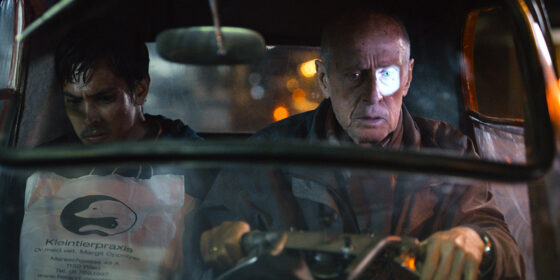Nobadi (Karl Markovics, Austria) — Contemporary World Cinema

By Courtney Duckworth
Karl Makovics’ Nobadi gestures toward revelations that never resonate. Ostensibly a culture-clash tale about a cantankerous (read: bigoted) old German man named Robert (Heinz Trixner) and an Afghani migrant (Borhanulddin Hassan Zadeh, embodying a gesture at politics more than a human being) who he contracts to bury his late companion, a fluffy dog, the film buckles under the violent ruptures of its later passages. This is because Makovics withholds the unspooling of his gravedigger’s traumas—which Zadeh, left adrift, monologues like a dispassionate news article about the Taliban rather than a series of deeply felt experiences—until the gory, desolate denouement.
That Nobadi, as he was nicknamed by European officials at a NATO camp, is a nobody for most of the runtime means we simply watch Robert shower abuse upon a cipher: he demands Nobadi’s phone after he catches him chatting while working, and makes the nervous young man strip to prove he hasn’t pilfered cash Robert mislaid. Any stirring of feeling activated by the Meals on Wheels woman who comes by to bring the geezer takeout is quashed when he makes his Muslim labourer eat it, despite the fact that it contains (of course) pork. While it at first feels welcome that the film doesn’t slide into the easy grooves of a “common-ground” story that doesn’t reflect lived realities, Makovics has only replaced that rote narrative with a litany of empty hatred. A late about-face finds the old man trying to save Nobadi from the life-or-death progression of a lingering injury: when Nobadi admits he doesn’t have papers, the old man whisks him to the veterinarian who took care of his pooch, linking the dog and the dog-tired migrantas if to say that both are treated like animals. This linkage continues until the shocking, blood-soaked ending, but if Makovics means to suggest that the current migrant crisis and a previous one (hint: the Holocaust) are linked, or that wanting to help is not enough, or that helping too late may instead cause real harm, he does so merely by making the audience suffer, and nobody deserves that.


